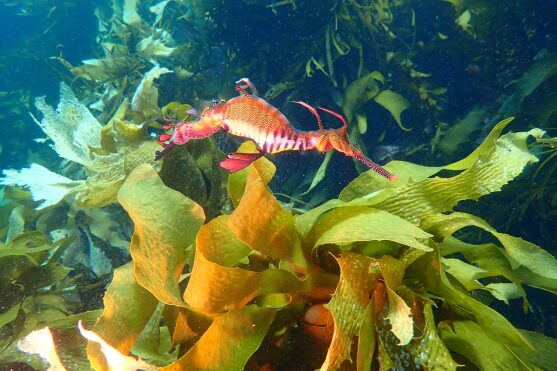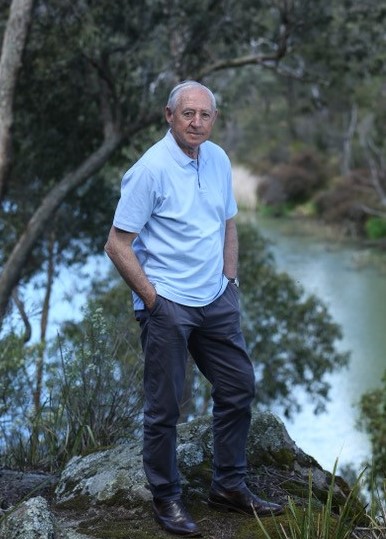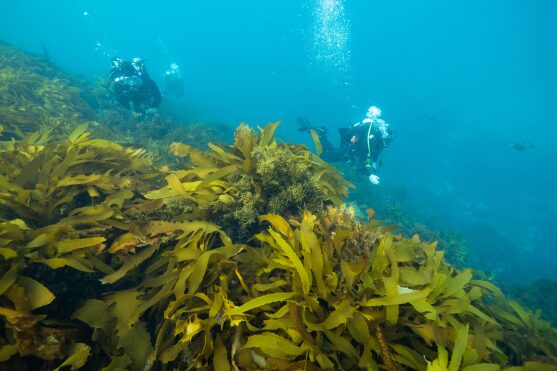Rob McLean and The Nature Conservancy: ‘We wanted to be involved in an organisation that’s kicking goals’

Philanthropist Rob McLean AM is excited as he talks about kelp. He’s explaining the potential for ‘blue carbon’ and recent exploration of the prospect of mangroves, sea grasses and regrown kelp forests becoming options for carbon storage. It’s an initiative by The Nature Conservancy, a global organisation that he helped bring to Australia.
This story was first published in the hardcopy edition of Inspiring Stories of Giving volume 1 in October 2023.

Rob, who has also chaired the organisation’s Australian Advisory Board since 2005, says it is looking to regrow three hectares of the decimated Tasmanian kelp forests, with plans to expand to 10 hectares – and maybe 100 hectares – if the experiment proves a success.
This is one of many of the organisation’s projects that he is across, as a major donor and advisor, and he is deeply passionate about the work.
“When I first heard about The Nature Conservancy, somebody had described them as ‘the problem solvers for the environment’,” he says. “In my life at McKinsey and beyond, that had been what I did: problem solving, so it appealed to me.”
The McLean Foundation, along with another leading philanthropist, David Thomas, was instrumental in funding feasibility studies and then the early work of The Nature Conservancy Australia, which has since participated in projects everywhere from Albany to Cape York to Borneo.
The organisation has been able to make strides because of the quality of its scientists, but also because it has the freedom to explore ideas and to trial potential environmental solutions, thanks to unrestricted funding by Rob and other donors, including a significant capacity-building donation of $1 million by the McLean Foundation in 2014. It’s a huge part of his giving ethos, not to tie funding to a particular program, potentially handcuffing those you are trusting to make the largest possible impact with the donated funds.
“We want to be involved in an organisations that is kicking goals and doing great work, so capacity building funding is what tickles our fancy,” Rob says. “Many donors want to invest in projects, not overheads, and there is a place for that, but we think there’s greater impact that comes from funding for capacity. The easiest money to get is project money but the most valuable and most effective is helping an organisation grow and scale. What continues to excite me about The Nature Conservancy is that it continues to innovate and come up with new ideas and ways of protecting nature and people.”
Paula McLean speaks passionately of the joy that comes for philanthropists in becoming deeply involved with organisations: to learn their world, make true connections and know how and where you can help. This is certainly true of the work she, Rob and eldest daughter Heather, also a trustee, have done with The Nature Conservancy. The family foundation does everything from in-kind and cash donations to enabling workshops. Paula has created the Nature Conservancy Australia’s Nature Writing Prize, a biennial contest most recently awarded in November 2023 at an event featuring Tim Winton, supports international bird flyways and has their son-in-law help put together a partner organisation’s website.

Rob is proud of what they’ve achieved, such as the innovative Murray Darling Balance Water Fund, which delivers investor returns while also giving 20% or more of the water back to wetlands every year. “Before we could create that fund, we needed to put a model together for investors and demonstrate the returns were there, and that all came from philanthropy,” Rob says.
Likewise with the kelp forest regeneration, which may be an early step towards one day producing green bonds. “Before you can get to that, you have to do this proof-of-concept work, that you can actually grow the kelp forests and it survives and doesn’t get eaten by sea urchins, and that’s where philanthropy carries the front-end load and has to do the work to get the results,” Rob said.
“I love the phrase, that philanthropy is risk capital,” he said. “Philanthropists understand not everything is going to work and sometimes you’re going to put your money in and you’re going to blow your dough, but on the other hand, that’s the way we prove things out and take steps forward.”